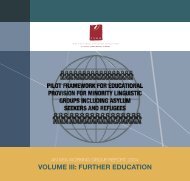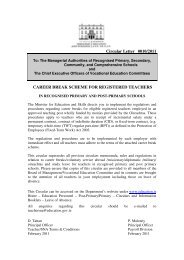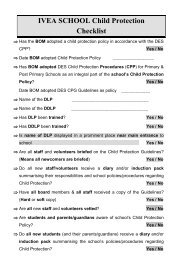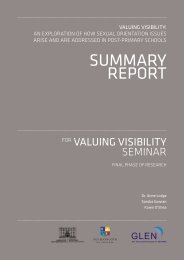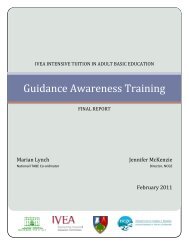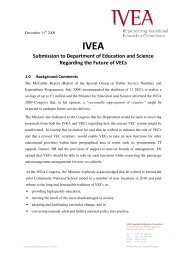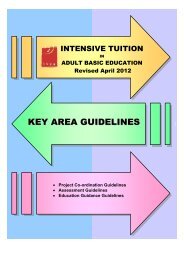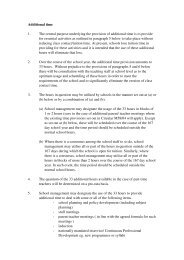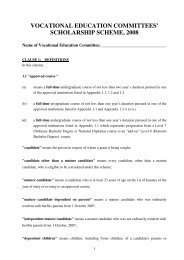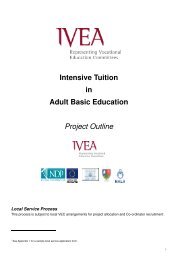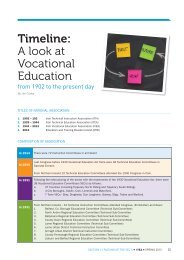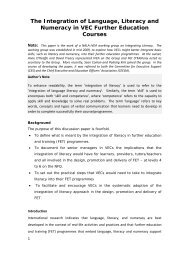Download File - IVEA
Download File - IVEA
Download File - IVEA
Create successful ePaper yourself
Turn your PDF publications into a flip-book with our unique Google optimized e-Paper software.
separated children holistically, the forthcoming report by Ward makes<br />
recommendations to enable the State meet its obligations towards<br />
separated children. Stressing that educational provision is inextricably<br />
linked to equality and interculturalism, recommendations relate to<br />
overall co-ordination, assessment, reception and orientation, supporting<br />
bilingual/multilingual students, school attendance and student supports.<br />
In addition, many of the recommendations are also relevant to other<br />
bilingual and multilingual children in schools.<br />
7.3 PROFILE OF SEPARATED CHILDREN IN<br />
THE DUBLIN AREA<br />
A major research survey focussing on separated children and young<br />
people living in the Dublin area conducted by Ward 84 during 2003<br />
presents a comprehensive profile of bilingual/EAL learners. Representing<br />
an overall response rate of 31%, 154 questionnaires were returned from<br />
a sample population of almost 500 separated children. Survey results<br />
refer to nationality, gender, age, area, legal status, accommodation,<br />
mother tongue, experience of learning another language, educational<br />
background, schooling in Ireland, literacy and basic education needs,<br />
learning English in Ireland, reasons for learning English and educational<br />
aspirations. The survey reveals a high level of linguistic diversity among<br />
the group, with the majority of survey participants originating from Africa.<br />
Although a considerable number of respondents already speak English,<br />
approximately 20% of respondents experience difficulties reading<br />
and writing in their first/another language. Furthermore, most survey<br />
respondents had extremely high educational aspirations with many aiming<br />
to attend university.<br />
7.3.1 Summary of Research Findings<br />
Ward’s findings included:<br />
• When a separated child is under 18 years, a Health Board<br />
representative (Social/Project Worker) attends their asylum interview,<br />
together with a legal representative. Asylum Interviewers and<br />
Deciding Officers also undergo training with the UNHCR on<br />
interviewing children.<br />
• When a child has become identified as being an unaccompanied<br />
minor or separated child, they are referred to the Social Work Team<br />
for Separated Children.<br />
• Team social workers assess all newly arrived separated children<br />
and place them in hostel type accommodation centres. Smaller<br />
numbers of separated children are also accommodated in ‘supported<br />
lodgings’, foster and care homes. With the same rights as all<br />
other children in Ireland, separated children have access to<br />
several additional services given that they have no parents/guardians/<br />
legal caregivers.<br />
ˇ• Baseline statistics on separated children living in Dublin reveal that<br />
they originate from Nigeria (44%) or other African countries such as<br />
Sierra Leone (6%), D.R. Congo (3%), Ghana (3%), Cameroon (2%)<br />
and Zimbabwe (2%).<br />
• Approximately 55% of survey respondents were male and the<br />
remainder female (45%).<br />
• Almost half of the 154 separated children who responded to this<br />
study were 17 years old. Between the ages of 18-21 years, a further<br />
38% of respondents have ‘aged out’ and are no longer legally<br />
considered a child. A further 10% were 16 years old and 2% 15<br />
years or 2% 14 years and under.<br />
• While over half of respondents were asylum seekers (86%), a further<br />
7% had lodged an asylum appeal and another 3% an application for<br />
leave to remain. Although 2% were parents of an Irish citizen child,<br />
3% selected the ‘other’ category.<br />
• A total of 32 mother tongues were catalogued for 154 respondents,<br />
indicating immense linguistic diversity among the population. African<br />
community languages feature prominently, particularly those from<br />
Nigeria within Africa’s principal linguistic group, Niger-Congo.<br />
• About 78% had studied another language within a formal education<br />
setting, in school or college. Other respondents had studied<br />
language through self-study at home (6%) or by living/working in<br />
another country (6%).<br />
• Most survey participants had attended primary education (71%) and<br />
secondary/technical school (66%).<br />
• Most separated children surveyed were attending some form of<br />
educational provision (79%). Almost half of survey participants were<br />
studying for a major state examination, 9% were pursuing the Junior<br />
Certificate and 40% the Leaving Certificate.<br />
• Over 18% of respondents experience difficulties with reading in their<br />
first or another language and 21% had difficulties writing.<br />
Respondents with literacy difficulties were generally not in school<br />
and aged over 16 years. [The overall percentage of separated<br />
children with literacy difficulties is presumably higher as it is unlikely<br />
that separated children with literacy difficulties responded to<br />
the survey].<br />
• Almost 61% of respondents were studying English in classes based<br />
within a school.<br />
• Almost all separated children in this research project survey aspire<br />
to attend university or vocational training.<br />
• Education providers and NGOs have made special efforts to meet<br />
the study needs of separated children by providing homework or<br />
after schools clubs with mixed results.<br />
• Almost every school, education centre, programme and NGO<br />
interviewed recommended that an initial educational assessment and<br />
guidance service should be established for separated children.<br />
• School placement has been more successful when local community<br />
groups have become involved.<br />
• The psychological needs of separated children are complex and<br />
multifarious and include safety needs, belonging needs (family<br />
contact, experience of friendship), esteem needs and belief in a<br />
future. This has been acknowledged by NGOs, VECs and youth<br />
services with events and activities organised accordingly.<br />
34<br />
84<br />
This research survey was a component of the overall research conducted in compiling the forthcoming report entitled ‘Education and Language Needs of Separated Children’ (published by CDVEC/Co. Dublin VEC/Dún Laoghaire VEC &<br />
authored by Tanya Ward).



